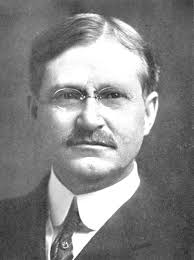
Within Lindsborg, patriotism was a major topic. Due to the mix of heritage within the town, there were questions of loyalty. Sweden was a neutral territory throughout the war, but at times their alliance was questioned due to Germany’s attempts to make Sweden their ally. While the King had rejected these offers, people were still worried that Sweden would not be able to remain neutral throughout the war. [1] Doubt of Swedish loyalty could prove to be an issue within Lindsborg, a town populated by mainly Swedish. Despite being Swedish, the vast majority of people in Lindsborg were intensely patriotic to the United States during the war as seen by enlistment numbers an attendance at speeches that were designed to promote the American war effort.

After the U.S. declaration of war Charles F. Scott, a former Republican member of the U.S. Congress from 1900-10 and candidate for U.S. Senate in 1918, gave a speech in Lindsborg about the war and the reasons for the United States joining. Around 1,500 people attended this speech by the newspaper editor from Iola, Kansas.[2] He spoke to the people about his experience from going on a ship over to Germany before U.S. involvement. It was obvious Germany was blocking Democracy from the world.[3] This was one of the reasons that the U.S. was going to war. And by Scott speaking to the citizens of Lindsborg and surrounding areas, the support for the war must have been at an all time high due to the way the crowd reacted to his hour long speech. Scott Speaks on War Situation
Another topic of question when it came to patriotism was: Why? Not only in Lindsborg but across the nation, everyone was wondering as to how the U.S. would benefit from this war and why they joined. There was an article in the Lindsborg newspaper titled What We’ll Get from the War. The answer was a stronger sense of patriotism; that the support for this country and its decisions will be higher than ever, and it will prove that immigrants are just as loyal to the country. He goes to the extent of saying that any foreigner who did not support the war will leave, and that all the soldiers that return will be extreme examples of patriotic citizens. [4] Benefits of the War
War Ends and Lindsborg Reacts

It was the eleventh hour of the eleventh month on the eleventh day when the Great War ended in 1918. Early that same morning, Germany signed an armistice agreement with the Allied forces near Compiégne, France. Approximately nine million soldiers were left dead and nearly twenty one million wounded. World War I became known as the “war to end all wars” because of the great disaster, destruction and deaths it caused. [5]
In the November 15, 1918 Lindsborg News Record, it states that the people of Lindsborg began celebrating an Allied victory as soon as it was announced. Everyone had patriotic enthusiasm and businesses began filling their windows and awnings with flags. Headed by the Bethany College Band, many grade school and Bethany students marched up and down Main Street announcing the news. That afternoon, the entire community celebrated with a parade headed by President Ernst Pihlblad, Lieutenant Speer who headed the S.A.T.C., and the Bethany Band. The State Guard and S. A. T. C. men followed them carrying their guns, and students from the college and schools came close behind. Celebrants dragged an effigy of the Kaiser down the street as the State Guards put bullets through it. The procession was led to the Auditorium where people in and around the vicinity gathered to hear patriotic words and songs. To end the celebration, people prayed for the men that were “over there,” for the leaders of the nation, and to God in thanksgiving. Then, the effigy of the Kaiser was burned. [6]
The 1919 Treaty of Versailles-a peace treaty officially ending the war- forced Germany to pay for what they had done and it destabilized Europe and laid the groundwork for World War II to erupt. [4] November 11, 1918, marked the anniversary for what was called “Armistice Day” and it celebrated the veterans of World War I. After World War II, it was changed to “Veteran’s Day” to honor all who serve(d). [7]
[1] “Swedish Neutrality,” Wikipedia, The Free Encyclopedia, accessed November 24, 2016, https://en.wikipedia.org/wiki/Swedish_neutrality.
[2] “Charles Frederick Scott,” Kansapedia, accessed March 28, 2017, https://www.kshs.org/kansapedia/charles-frederick-scott/16960.
[3] Lindsborg News Record, August 17, 1917.
[43] Lindsborg News Record, July 13, 1917.
[5] “On This Day in History: Nov 11: World War I Ends,” A&E Television Networks, accessed December 8, 2016. http://www.history.com/this-day-in-history/world-war-i-ends.
[6] Lindsborg News Record, November 15, 1918.
[7] “Armistice Day,” Wikipedia, The Free Encyclopedia, accessed November 24, 2016. https://en.wikipedia.org/wiki/Armistice_Day.
